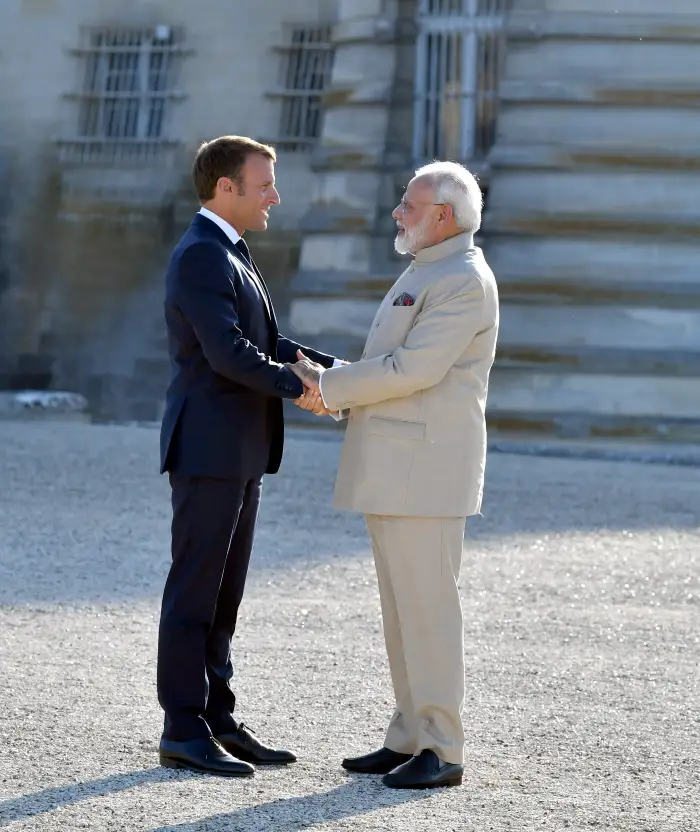After the signing of a security pact between Australia, the United Kingdom and United States (AUKUS), an exciting opportunity has unexpectedly arisen for France, and, in fact, an orphaned European Union (EU) to open a grand security partnership with India.
The French have already sniffed a major strategic opportunity after Paris was side-lined by the three English speaking nations of the Atlantic Alliance, which forged a separate pact to counter an assertive and rising China. France was furious with the move. Its angst was fuelled by considerations at two levels.
First, the formation of the AUKUS was a huge commercial blow. This was because coupled with the formation of the trilateral grouping, a decision was taken to arm Australia, the frontline state against China, with nuclear powered submarines. This decision had a major fallout. Now that Australia would be armed with extremely powerful nuclear-powered boats, that too with tech transfers from the United States, there was no need for the Australians to honour their contract of French Barracuda class conventional submarines. As a result, France lost a contract worth an estimated $40 billion.
Apart from commerce, the French were incensed by an even more powerful consideration. By forming AUKUS, the US had announced that France, and in fact, the EU was no longer part of a core alliance to counter China. Clearly, the French and the EU were stumped by the sudden move.
The French can be forgiven for not holding back, and for choosing to mount a fierce rhetorical attack on the AUKUS trio. French foreign minister Jean-Yves Le Drian, went ballistic and a shade undiplomatic when he called the trilateral move a “stab in the back”. After a studied silence, the EU too minced no words in criticising the formation of AUKUS, and aired its full support for beleaguered France.
To Paris’ credit, it did not take President Emmanuel Macron to mount a robust riposte against the US-led move. That is where India and the personal equation between him and Indian Prime Minister Narendra Modi came in.
On Tuesday, Macron picked up the phone and called Modi. Three key points stand out in an important conversation.
First, the two leaders vowed to “"act jointly in an open and inclusive Indo-Pacific area". That could imply anything from intelligence sharing, coordinated patrolling, to sharing of naval bases in the Indian Ocean Region, where, for historical reasons, France has a significant presence. A logistics agreement with France can allow India access to a French base in the Reunion Islands –not far from Madagascar. France also has a naval facility at Mayotte.
Second, the French President pointedly asserted that Paris respected India’s “strategic autonomy”—a phrase that implies that New Delhi, as a significant power following the 1998 nuclear tests, was free to bond with other players of the global multipolar system. In other words, France was not expecting any zero-sum strategic commitments from New Delhi.
Third, France was ready to open the floodgates of its world class technology to India. A statement from Macron’s office said that Paris was ready to strengthen India’s “industry and technology base, as part of a close relationship based on trust and mutual respect".
Finally, and perhaps most significantly, the French were saying that they could become the vanguard of a special security relationship between India and Europe.
The commitment to stability in the Indo-Pacific region would be under "the framework of the Europe-India relationship and European initiatives in the Indo-Pacific", said a statement released by the French embassy in New Delhi.
Both leaders also expressed their grave concerns about the situation in Afghanistan. “The authorities in power must cut their ties with international terrorism, allow humanitarian organisations to operate throughout the country and respect the fundamental rights of Afghan women and men. Evacuation operations should continue unhindered,” the French statement said.
On his part Modi warmly welcomed the President Macron’s call. In a tweet, he called Macron "my friend," adding that India placed "great value on our strategic partnership with France".
Spoke with my friend President @EmmanuelMacron on the situation in Afghanistan. We also discussed closer collaboration between India and France in the Indo-Pacific. We place great value on our Strategic Partnership with France, including in the UNSC.
— Narendra Modi (@narendramodi) September 21, 2021
Also Read: Modi, Macron discuss Indo-Pacific amid seismic shifts in the region




















